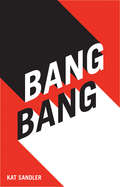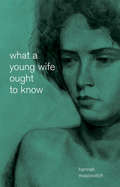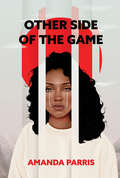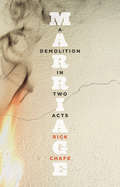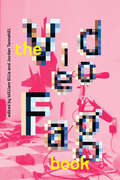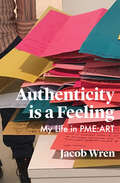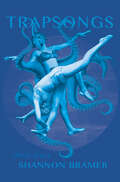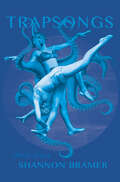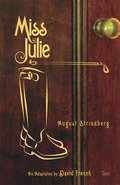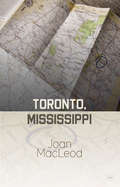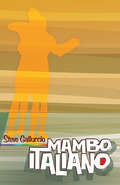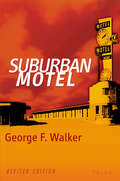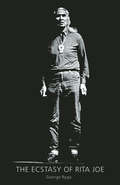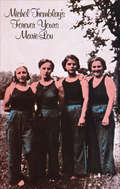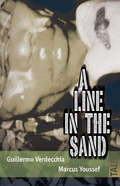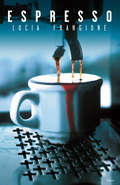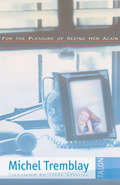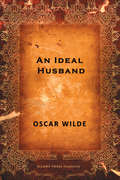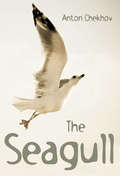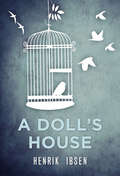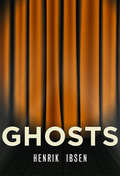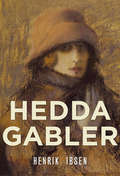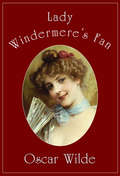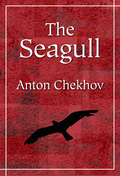- Table View
- List View
BANG BANG
by Kat SandlerLila, a young Black ex-cop, has been on leave from the police force ever since she shot an unarmed Black youth. She’s moved back in with her mother, Karen, and is drinking beer for breakfast. So when Tim, a white playwright, shows up at her door to casually inform her that his play inspired by her experience is being adapted into a movie, Lila’s trauma is dragged out for speculation once again. The star of the film, their ex-cop bodyguard and Karen are pulled into the fight, leading to an epic metatheatrical standoff in a living room play about a living room play about gun violence, police, art and appropriation. This dark, fast-paced dramedy by the author of Punch Up and Mustard traces the responsibility we have as artists in storytelling and the impact of what it means to be inspired by true events.
What a Young Wife Ought to Know
by Hannah MoscovitchJust don’t lie down and no child will come.It’s Ottawa in the 1920s, pre-legalized birth control. Sophie, a young working-class girl, falls madly in love with and marries a stable-hand named Jonny. After two difficult childbirths, doctors tell Sophie she shouldn’t have any more children, but don’t tell her how to prevent it. When Sophie inevitably becomes pregnant again, she faces a grim dilemma.In an unflinching look at love, sex, and fertility, and inspired by real stories of mothers during the Canadian birth-control movement of the early twentieth century, one of Canada’s most celebrated playwrights vividly recreates a couple’s struggles with reproduction.
Other Side of the Game
by Amanda ParrisI don’t think you can expect society to change if you’re not ready to take the first step. In the 1970s Beverly walks into an office of Black activists, wanting to join the Movement, and has to prove she’s committed enough to fight. Some forty years later, in the Hip Hop Generation, Nicole reunites with her ex-boyfriend on a basketball court, wondering where he’s been, when a police officer stops them. In this striking debut, Amanda Parris turns the spotlight on the Black women who organize communities, support their incarcerated loved ones, and battle institutions, living each day by a ride-or-die philosophy, strengthening their voices and demanding to be heard.
Marriage: A Demolition in Two Acts
by Rick ChafePut away the knives because tensions are rising in this kitchen renovation. What could help patch up a marriage better than a home renovation? Wayne thinks he’s doing his wife Julie a favour by hiring a young couple to help redo the kitchen (at a fraction of the cost she’d hoped for). But Julie has higher standards in mind. John and Maggie think they’ve found a way to make some quick money to pay off the land John bought. John just proposed, but Maggie hasn’t given her answer yet. With both couples on edge amongst themselves and with each other, everything from kitchen cabinets and coffee makers to generational differences and life choices are cause for ridicule, making a play that’s hilarious and relatable.
The Videofag Book
by William Ellis Jordan TannahillLonglisted for the 2018 Toronto Book AwardsIn October 2012, lovers William Ellis and Jordan Tannahill moved into a former barbershop in Toronto's Kensington Market neighbourhood and turned it into an art space called Videofag. Over the next four years Videofag became a hub for counterculture in the city, playing host to a litany of performances, screenings, parties, exhibitions, and all manner of queer fuckery. But hosting a city in their house took its toll and eventually William and Jordan broke up, closing the space for good in June 2016.The Videofag Book is a chronicle of those four years told through multiple voices and mediums: a personal history by William and Jordan; a love letter by Jon Davies; a communal oral history compiled by Chandler Levack; a play by Greg MacArthur; a poem by Aisha Sasha John; a chronological history of Videofag's programming; and a photo archive curated by William and Jordan in full colour.
Authenticity is a Feeling: My Life in PMR-ART
by Jacob WrenAuthenticity is a Feeling: My Life in PME-ART is a compelling hybrid of history, memoir, and performance theory. It tells the story of the interdisciplinary performance group PME-ART and their ongoing endeavour to make a new kind of highly collaborative theatre dedicated to the fragile but essential act of "being yourself in a performance situation."Written, among other things, to celebrate PME-ART's twentieth anniversary, the book begins when Jacob Wren meets Sylvie Lachance and Richard Ducharme, moves from Toronto to Montreal to make just one project, but instead ends up spending the next twenty years creating an eccentric, often bilingual, art. It is a book about being unable to learn French yet nonetheless remaining Co-Artistic Director of a French-speaking performance group, about the Spinal Tap-like adventures of being continuously on tour, about the rewards and difficulties of intensive collaborations, about making performances that break the mold and confronting the repercussions of doing so. A book that aims to change the rules for how interdisciplinary performance can be written about today.When Jacob finished a first draft of the book he sent it to many of those who had co-created or worked on PME-ART projects asking for their comments. Therefore, the book also features contributions from: Caroline Dubois, Richard Ducharme, Claudia Fancello, Marie Claire Forté, Adam Kinner, Sylvie Lachance, Nadia Ross, Yves Sheriff, Kathrin Tiedemann and Ashlea Watkin.
Trapsongs: Three Plays
by Shannon BramerWith an introduction by Sara TilleyFrom playwright and poet Shannon Bramer comes Trapsongs, a collection of three dark comedies that navigate the realm of the surreal and absurd. In "Monarita," an intimate friendship between Mona, a frazzled new mother, and Rita, her beloved, estranged friend, is explored. Their interaction is a dance—part ballet, part mud-fight. In "The Collectors," Hanna Parson is being harassed by three ghastly collection agents who force her to confront her debt and isolation as she struggles to create meaningful art in her dishevelled apartment. And in the tragicomedy "The Hungriest Woman in the World," Aimee, a former artist, invites her preoccupied, workaholic husband, Robert, to the theatre to see a play about a sad octopus. His refusal sends her on a dark and playful journey into the topsy-turvy world of theatre itself.Trapsongs is by turns comedic, grotesque, and profane, but is all the while a tender exploration of the human condition in all its hilarious and humbling glory. Although each of these plays is a discrete creation, they contain and hold each other like a Matryoshka doll; all of the main characters are trapped within the song of their own lives.
Trapsongs: Three Plays
by Shannon Bramer Sara TilleyWith an introduction by Sara TilleyFrom playwright and poet Shannon Bramer comes Trapsongs, a collection of three dark comedies that navigate the realm of the surreal and absurd.In "Monarita," an intimate friendship between Mona, a frazzled new mother, and Rita, her beloved, estranged friend, is explored. Their interaction is a dance—part ballet, part mud-fight. In "The Collectors," Hanna Parson is being harassed by three ghastly collection agents who force her to confront her debt and isolation as she struggles to create meaningful art in her dishevelled apartment. And in the tragicomedy "The Hungriest Woman in the World," Aimee, a former artist, invites her preoccupied, workaholic husband, Robert, to the theatre to see a play about a sad octopus. His refusal sends her on a dark and playful journey into the topsy-turvy world of theatre itself.Trapsongs is by turns comedic, grotesque, and profane, but is all the while a tender exploration of the human condition in all its hilarious and humbling glory. Although each of these plays is a discrete creation, they contain and hold each other like a Matryoshka doll; all of the main characters are trapped within the song of their own lives.
Trapsongs: Three Plays
by Shannon BramerWith an introduction by Sara TilleyFrom playwright and poet Shannon Bramer comes Trapsongs, a collection of three dark comedies that navigate the realm of the surreal and absurd.In "Monarita," an intimate friendship between Mona, a frazzled new mother, and Rita, her beloved, estranged friend, is explored. Their interaction is a dance—part ballet, part mud-fight. In "The Collectors," Hanna Parson is being harassed by three ghastly collection agents who force her to confront her debt and isolation as she struggles to create meaningful art in her dishevelled apartment. And in the tragicomedy "The Hungriest Woman in the World," Aimee, a former artist, invites her preoccupied, workaholic husband, Robert, to the theatre to see a play about a sad octopus. His refusal sends her on a dark and playful journey into the topsy-turvy world of theatre itself.Trapsongs is by turns comedic, grotesque, and profane, but is all the while a tender exploration of the human condition in all its hilarious and humbling glory. Although each of these plays is a discrete creation, they contain and hold each other like a Matryoshka doll; all of the main characters are trapped within the song of their own lives.
Miss Julie
by David French August StrindbergDavid French's adaptation of August Strindberg's disturbing and enduring drama of the transgressive affair between the daughter of a count and the count's man-servant has an eerie contemporary feel about it. French has sharpened the psychodramas of the original - scenes of desire, anger, jealousy, coercion, manipulation, exploitation, arrogance, dominance, submission, and deceit. Cast of 2 women and 1 man.
Toronto, Mississippi
by Joan MacleodJhana, is a beautiful eighteen-year-old who lives with her mother Maddie and their boarder Bill, a sometime poet. Jhana's father, King, shows up partway through the first act and its his presence for the first time in a long time in this unusual family that really galvanizes all four of the characters into action. King is an Elvis impersonator, getting sick and tired of doing the same old song and dance. Jhana is mentally handicapped and working at her first "job" in a workshop for disabled people where she puts four screws in a bag and then another four screws in another bag and so on. In her mind she is on stage at Maple Leaf Gardens singing and strutting her stuff, just like her father does. Maddie is trying to keep it together while working full time as a teacher and as a mother, too busy to admit to her own loneliness. Bill is harbouring all sorts of feelings for Maddie that he is afraid to act on. While this is a play about the power of family and love, it is finally a play about self destruction and creation. At its heart is Jhana, whose character begs the question whether the other characters, in their own ways, are any less handicapped. She's good company--funny, driven, passionate and yearning for the same things those around her yearn for--if they can get over their preconceptions about the mentally handicapped and give her the space to achieve her dreams. The play came out of the author's decade-long involvement working with mentally handicapped adults and children as a life skills instructor. Re-released in a revised and updated edition, it is Joan MacLeod's first full-length play, receiving over twenty international productions over the past two decades.
Mambo Italiano
by Steve GalluccioMambo Italiano achieves its overwhelming power through a perfect balance of fast-paced comedy and poignant drama. Angelo, at the prompting of his equally repressed sister Anna, has told his very traditionally Italian immigrant parents, Maria and Gino, that he is gay. Hurt, betrayed and mortified by Angelo's coming out, his lover Nino is not unprepared for his widowed Italian mother Lina's reaction--a full-on operatic barrage of melodrama and hysterical excess so profound it gives even Angelo's shocked parents pause for second thoughts and prompts a hilarious and touching re-examination of their own outraged response to their son. Seeing their relationship shattered by their families' reactions of grotesquely overplayed comedy and pathos, Angelo emerges from the drama with his new-found pride intact, while Nino retreats even further into the darkness of his bisexual closet. While the press has often called the film version of Mambo Italiano "a gay My Big Fat Greek Wedding," there is far more at work in the play than the zealous mining of Italian immigrant family and gay culture stereotypes. Translated by Michel Tremblay, its huge fan, into a wildly successful Francophone theatrical phenomenon, Mambo Italiano is far more about the dynamics of family, about the vast spaces between the old world and the new, about grasping the resonant codes embedded in what is said and what is meant in ordinary speech, than it is "about" gay culture. In perhaps the play's most defining scene, the parish priest has been bribed with a bottle of wine and a carton of cigarettes to vacate his confessional so it can be occupied by the members of Angelo's family to ritually unburden themselves of their hilarious sins of personal hypocrisy, willful misapprehension and thoughtless transgression. Cast of 4 women and 3 men.
Suburban Motel
by George F. WalkerSix plays, united only by the fact that they take place in one and the same suburban motel room: Problem Child, Criminal Genius, Risk Everything, Adult Entertainment, Featuring Loretta, and The End of Civilization. Transients, lovers, the haunted, the hunted, the desperate, the dumb, each "strut and fret their hour upon the stage and then are heard of no more.
The Ecstasy of Rita Joe
by George RygaRita Joe is a Native girl who leaves the reservation for the city, only to die on skid row as a victim of white men's violence and paternalistic attitudes towards First Nations peoples. As perhaps the best-known contemporary Canadian play and a poetic drama of enormous theatrical power, The Ecstasy of Rita Joe had a major influence in awakening consciousness to the "Indian problem" both in whites and Natives themselves.Cast of five women and 15 men. With a preface by Chief Dan George.The Ecstasy of Rita Joe premiered November 23, 1967 at the Vancouver Playhouse.
Forever Yours, Marie-Lou
by Michel Tremblay Bill Glassco John Van BurekTwo grown sisters confront the memory of their parents' tragic death.This revised edition of Forever Yours, Marie-Lou, which played at the 1990 Stratford Festival, is John Van Burek and Bill Glassco's translation of Michel Tremblay's original French text.Cast of 3 women and 1 man.
A Line in the Sand
by Guillermo Verdecchia Marcus YoussefIn the autumn of 1990, during Operation Desert Storm, two young men, one a troubled Canadian soldier, the other a teenage Palestinian black-marketeer, meet in the scorched Qatari desert. Breaching the divide of a profound cultural misunderstanding and against a backdrop of massive global conflict, these two become unlikely and secret friends. This tenuous friendship is severed by the torture and murder of the 16-year-old Palestinian inside the Canadian base--an act to which the Canadian soldier was at least a witness and perhaps a willing participant. Weaving poetic drama with myriad documentary sources, A Line in the Sand rips the benevolent mask off recent western peacekeeping operations and challenges Canada's long treasured national mythology that it is a nation of quiet diplomats. It asks us to imagine how horrors like these could be perpetrated with our money, in our name and by people much like us. Cast of 3 to 5 men.
Espresso
by Lucia FrangioneSexy, provocative and challenging, Espresso is a rich, dark, bitter hit of comedy and sensuality. One of Lucia Frangione's blasphemy plays,' it inverts the Catholic stereotypes of feminine sexuality to boldly examine their corresponding masculine sexual emblems of Father, Son and Holy Ghost. In an erotic world where men are traditionally cast as either fathers to be looked up to or sons to be looked after, where, for women, is the possibility of a flesh-and-blood lover, challenging her to open her heart without trespassing her will--a lover as he appears in the Song of Solomon: passionate, earthy, creative, vulnerable and beautiful-- the avatar of the holy spirit? There has been a horrible car crash, and Vito, the patriarch of an immigrant family, has had his body smashed and his heart lacerated, his life hanging by threads of tubes and wires in an intensive care ward. His family has rushed in from all over the country for an anxious vigil of hope, prayer and memory by his bedside. In this crucible of anxiety, a single actress alternately narrates and enacts her own and her family's history along with an uninvited narrator/actor, Amante ("lover" in Italian). As Amante engages all the women of the clan Rosa plays in a swirl of sharply portrayed characters--Vito's mother, Nonna, forced into marriage at thirteen but only now, at sixty-seven, experiencing the first intimations of her body's desire; the pit-bull martyrdom of Vito's second wife, Vincenza; and Rosa herself in her own thin, urbane skin stretched tight to hold in the red, passionate blood that boils just below the surface--we are never sure whether Rosa has created Amante or he has created her. Cast of 1 woman and 1 man.
For the Pleasure of Seeing Her Again
by Michel Tremblay Linda GaboriauFor the Pleasure of Seeing Her Again is Tremblay's homage to his mother, who nurtured his imagination, his reclusive reading habits and his love for the theatre and the arts, yet who did not live to witness the performance of Les Belles Soeurs-the first successful play written in joual with which Tremblay legitimized the Quebecois vernacular in the arts-and the world-wide acclaim for her son's artistic genius. In a compelling balance of humour and poignancy, Tremblay offers glimpses of himself and his mother at five different stages of their lives together, culminating in his reassurance of his dying mother's concern for him immediately prior to his spectacular success.
An Ideal Husband: A Play
by Oscar WildeSecrets and political intrigue threaten to destroy the marriage of Sir Robert and Lady Chiltern. Believing her husband to be "ideal," Lady Chiltern is unwilling to accept that their life has been built on a shady financial deal in Sir Robert's past, and that Sir Robert's mistakes are about to be made public by Mrs. Cheveley. Only the intercession of Lord Goring can bring a halt to Mrs. Cheveley's schemes and reconcile Lady Chiltern with her ideal husband.
The Seagull
by Anton ChekhovAnton Chekhov's The Seagull was written in 1895 and first staged in 1896. It dramatises the romantic and artistic conflicts between four characters: the famous middlebrow story writer Boris Trigorin, the ingenue Nina, the fading actress Irina Arkadina, and her son the symbolist playwright Konstantin Tréplev. Though the character of Trigorin is considered Chekhov's greatest male role like Chekhov's other full-length plays, The Seagull relies upon an ensemble cast of diverse, fully developed characters. In contrast to the melodrama of mainstream 19th-century theatre, lurid actions (such as Konstantin's suicide attempts) are not shown onstage. Characters tend to speak in ways that skirt around issues rather than addressing them directly; in other words, their lines are full of what is known in dramatic practice as subtext. A play more character driven than plot driven, it remains a staple for theatrical production companies to this day.
A Doll's House
by Henrik IbsenNora Helmers has recently placed herself at considerable financial risk so that her husband, the overbearing Torvald, could recuperate from an illness. Torvald thinks Nora careless and childlike—his doll—and proves unable to comprehend the depth of her affection and sacrifice. Nora comes to see her marriage for what it is and will contemplate the unthinkable. A Doll's House was first staged in Copenhagen, Denmark, in 1879. The play is important for it's criticism of 19th century marriage norms—the first seeds of feminism.
Ghosts
by Henrik IbsenMrs. Alving is building an orphanage as a memorial to her husband, and her son Oswald has returned for the occasion after many years abroad. The sins of the father are visited upon the unfortunate Oswald, however, and what unfolds is a staggering tale involving religion, venereal disease, incest and euthanasia. Like many of Ibsen's plays, Ghosts is a scathing commentary on 19th-century morality. Because of its subject matter, it immediately generated strong controversy and negative criticism. Since then the play has fared better, and is considered a great play that historically holds a position of immense importance.
Hedda Gabler
by Henrik IbsenHedda Gabler features one of the stage's most unforgettable heroines—a role coveted by actresses the world over. Ibsen's fascinating tale of obsession and manipulation was first staged in 1891. Hedda, the daughter of an aristocratic general has just arrived home from her honeymoon with husband George Tesman. The reappearance of George's academic rival—and Hedda's former lover—throws all of their lives into disarray, with tragic consequences.
Lady Windermere's Fan
by Oscar WildeOscar Wilde's satiric comedy was first staged in London in 1892. Lady Windermere grows suspicious of her husband's interest in Mrs. Erlynne but the truth of the matter is not as it appears.
The Seagull
by Anton ChekhovAnton Chekhov's The Seagull was written in 1895 and first staged in 1896. It dramatises the romantic and artistic conflicts between four characters: the famous middlebrow story writer Boris Trigorin, the ingenue Nina, the fading actress Irina Arkadina, and her son the symbolist playwright Konstantin Tréplev. Though the character of Trigorin is considered Chekhov's greatest male role like Chekhov's other full-length plays, The Seagull relies upon an ensemble cast of diverse, fully developed characters. In contrast to the melodrama of mainstream 19th-century theatre, lurid actions (such as Konstantin's suicide attempts) are not shown onstage. Characters tend to speak in ways that skirt around issues rather than addressing them directly; in other words, their lines are full of what is known in dramatic practice as subtext. A play more character driven than plot driven, it remains a staple for theatrical production companies to this day.
